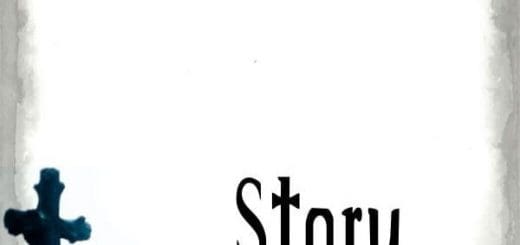The Horror Tree Presents: An Interview With J.D. Graves, Pushing the Boundaries with Econoclash

J.D. Graves, Pushing the Boundaries with Econoclash
By Angelique Fawns
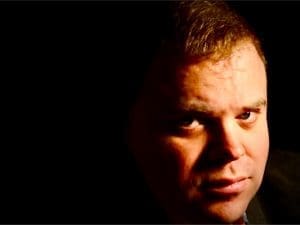 The Econoclash Review harkens back to the days of edgy pulp fiction and promises, “Quality Cheap Thrills”. This bi-annual anthology is the home for “shady casino hosts, murderous junkies, pregnant prom queens, strange kaiju cults, small town larceny and Sasquatch love brides.”
The Econoclash Review harkens back to the days of edgy pulp fiction and promises, “Quality Cheap Thrills”. This bi-annual anthology is the home for “shady casino hosts, murderous junkies, pregnant prom queens, strange kaiju cults, small town larceny and Sasquatch love brides.”
There is a definite “pulp” subculture thriving in the publishing world; and I’m thankful this genre is being kept alive by editors like J.D. Graves. A couple of years ago, I wrote a strange short story about a pot-smoking Rasta-Fairy. Graves is the kind of editor all starting fiction writers need to find. I submitted it to an open call for Econoclash, and even though the story wasn’t quite working, he gave me some advice and let me resubmit. You can find “High Adventure” in the latest edition of The Econoclash Review which just hit the bookstands recently.
AF: Can you tell me about the conception of Econoclash Review?
JG: Econoclash began as a conversation between myself and another writer. A two year off and on discussion led to us having very different ideas about the direction we should go, thus we decided to amicably split. I didn’t want Econoclash Review to compete with things like The New Yorker and Ploughshares or be another spot for those interested in “Literary Merit” as a selling point. At the time I just couldn’t see myself reading a bunch of Literary Fiction submissions. I kept Review in the name as an homage to my friend and I found delightful irony in calling something a Review while also calling it Cheap. Very satisfying. We put out four books before becoming an imprint of Down & Out Books.
AF: What is your definition of “Pulp Fiction”?
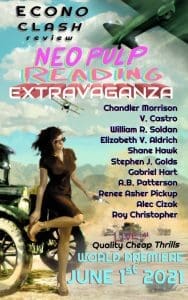 JG: Cheap disposable entertainment. Usually featuring luridly eye-catching covers, action driven plots, and short punchy sentences, sometimes barely edited by publishers more concerned with making a quick buck. Those stories were very exciting and the launching pad for most of the biggest authors in the 20th century. The Econoclash Review has been called neo-pulp by some enthusiasts, it’s also been called trash by haters. Which means that the The Econoclash Review must be doing things right.
JG: Cheap disposable entertainment. Usually featuring luridly eye-catching covers, action driven plots, and short punchy sentences, sometimes barely edited by publishers more concerned with making a quick buck. Those stories were very exciting and the launching pad for most of the biggest authors in the 20th century. The Econoclash Review has been called neo-pulp by some enthusiasts, it’s also been called trash by haters. Which means that the The Econoclash Review must be doing things right.
AF: Can you tell me about the Pulp Fiction community? I noticed you sometimes collaborate with Alec Cizak from Pulp Modern.
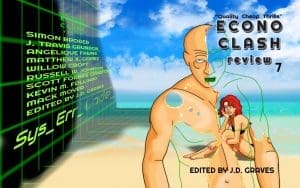 JG: I’m always willing to extend someone a helping hand. But this is actually a tough question to answer. 2020 was an incredibly rough year for publishing all over, but especially small indie genre publishers. Several of the rags that made up this community didn’t make it to 2021 due to internal decisions, economic issues, or straight up external hostility. These indie lit rags are not meant to last forever. But one label in particular Pulp Modern has proven it has the chops to remain in the game for a long time. I feel very fortunate to get to work with Alec Cizak and perform audio narration for his new Pulp Modern Flash material when I can. There have been some very good indie magazines that sprout, flower, then die. When they do they leave a hole. And what I’ve found is some of the more established authors who cut their teeth on these indie’s lineups are very sensitive to losing their launching grounds. I mean it’s not like they’re completely disappearing into the ether leaving only a reputation behind. Most of the old stuff can be found online, it never really goes away.
JG: I’m always willing to extend someone a helping hand. But this is actually a tough question to answer. 2020 was an incredibly rough year for publishing all over, but especially small indie genre publishers. Several of the rags that made up this community didn’t make it to 2021 due to internal decisions, economic issues, or straight up external hostility. These indie lit rags are not meant to last forever. But one label in particular Pulp Modern has proven it has the chops to remain in the game for a long time. I feel very fortunate to get to work with Alec Cizak and perform audio narration for his new Pulp Modern Flash material when I can. There have been some very good indie magazines that sprout, flower, then die. When they do they leave a hole. And what I’ve found is some of the more established authors who cut their teeth on these indie’s lineups are very sensitive to losing their launching grounds. I mean it’s not like they’re completely disappearing into the ether leaving only a reputation behind. Most of the old stuff can be found online, it never really goes away.
The Econoclash Review (ECR) is very fortunate to partner with Down & Out Books. Their support has been instrumental in helping grow the indie community when it comes specifically to crime/noir. Which makes ECR the oddball since we don’t limit ourselves to just that genre. The indie markets like ECR and Pulp Modern are where writers can develop their craft and pursue bigger things. I look forward to the new marketplaces that will emerge this year and beyond. I don’t look at them or the others still around as competition, since I’m a writer I want to publish stories. There’s a trend happening now where the short fiction anthologies are transitioning into publishing longer works. That was ECR’s plan for 2021. However, publishing novelettes/novellas/novels is on hold until at least 2022 as I have been fortunate enough to contract my own novel with a publisher. If you’re reading this now and have something you’d like ECR to review contact us. Our masthead is incredibly awesome and talented, and I’m blown away by the nonfiction work they do on top of their own fiction writing. Anything ECR can do to help the community grow stronger in the name of genre lit we will do.
AF: It’s wonderful for writers to have a place to try experimental writing. Do you have a day job?
JG: There’d be no way to keep the lights on at ECR without one…our sales are that good. But more importantly than employment, I have a wife and three kids that are amazing and I feel blessed to have their support. I’m currently employed in the educational-industrial complex as well as running a media company and I’ll leave it at that.
AF: You are also a successful stage play writer. Can you tell me about how you ventured into that realm and compare it to your other writing?
JG: T.S. Eliot said, “Home is where you start from.”
The theatre is one of those things that chooses you. My dad built a pair of matching bookshelves when I was born, I still use them today. I don’t remember a time when I didn’t have books. My mom taught English. And I was exposed to the classics growing up. But those things are difficult to read when you are in elementary school. I mean, Cliff-Notes were an outstanding introduction to harder books. When I discovered that nearly all of the classic books had been adapted into plays and they were only 90-100 pages long I started reading those. It’s a different experience but the story and the pathos they inspire doesn’t change. Since reading leads to writing, teenage me wrote poetry and plays and not much else. I didn’t start writing prose until graduate school (of which I dropped out). I’ve had three plays produced for an audience. “Tall Pines Lodge”, I wrote in three days and has been damned with high praise and boosted by condemnation. It’s a nasty slice of noir that holds nothing back, fans of the genre will appreciate it, however they usually don’t read plays. I’m currently in talks with actors for a cast recording.
AF: What sort of stories are you typically looking for?
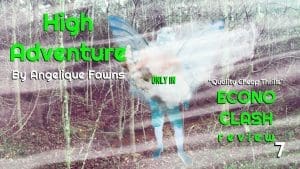 JG: I’m looking for writers to follow our submission guidelines. Please realize that I am a Gen Y Kid raised in the woods with poor network TV signal and a set of World Book Encyclopedias circa 1969. Which means I will give everything the benefit of the doubt, however my attention must be grabbed on the first page. First sentence must grab me with urgency. My time like yours has value, and I will move on sooner rather than later. This goes to everyone interested in contributing to The EconoClash Review, give us people (not characters) with problems who DO things that raise the stakes. Start with action, raise the action, conclude the action.
JG: I’m looking for writers to follow our submission guidelines. Please realize that I am a Gen Y Kid raised in the woods with poor network TV signal and a set of World Book Encyclopedias circa 1969. Which means I will give everything the benefit of the doubt, however my attention must be grabbed on the first page. First sentence must grab me with urgency. My time like yours has value, and I will move on sooner rather than later. This goes to everyone interested in contributing to The EconoClash Review, give us people (not characters) with problems who DO things that raise the stakes. Start with action, raise the action, conclude the action.
AF: Why did you like my story “High Adventure”
JG: The characters felt very real despite the fantastical nature of the scenario. It reminded me of early Phillip K Dick stories but with a definite 21st century twist. And it’s funny in places that I enjoyed. Humor’s important. High Adventure is a definite must read in issue 7. I particularly think the turn in the arc is worth the price of admission alone, it’s unexpected.
(Note, J.D. Graves helped me revise the story arc and saved the narrative.)
AF: You ventured into podcasting with Econoclash Review, The Podcast , can you tell me about that and any lessons you learned?
JG: It scratched an itch. But to do it right, It’s like everything else in this world–requires a full-time commitment to be successful. Also helps to have an investment of cash. The show’s on hiatus at the moment because to do what I wanted with it–took a large chunk of time from prior commitments. The episodes are still out there for now and interested people can give it a watch and a listen. I’m sincerely in awe of people like Frank Elder and others who produce a quality show every week and continue to work full time jobs and raise a family. We will launch a NEO-PULP READING EXTRAVAGANZA on June 1st, 2021 featuring some authors who haven’t appeared in the pages of ECR. It is going to be an epic showcase unlike anything that has been seen during the cruel year of our lord 2020.
AF: What is in the future for JD Graves?
JG: I have several novels coming soon from various places, as well as a short collection I’m shopping around. I wouldn’t expect them any time before 2022. So I will be hustling those as they appear and of course continue to publish quality cheap thrills. I will also be doing more audiobook work from this point on, so if you or anyone else ever need something narrated…I’d love to have chat.
- About the Author
- Latest Posts
Angelique Fawns writes horror, fantasy, kids short stories, and freelance journalism. Her day job is producing promos and after hours she takes care of her farm full of goats, horses, chickens, and her family. She has no idea how she finds time to write. She currently has stories in Ellery Queen, DreamForge Anvil, and Third Flatiron’s Gotta Wear Eclipse Glasses. You can follow her work and get writing tips and submission hints at http://fawns.ca/.



